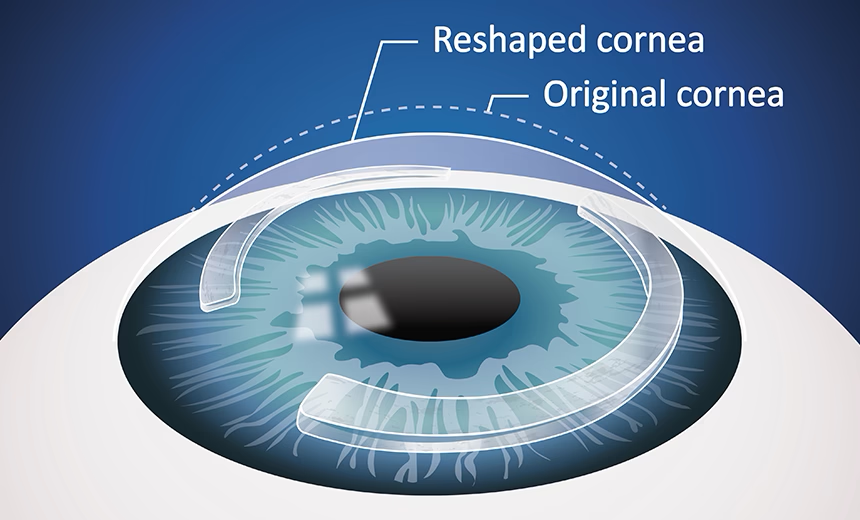Subscribe to eyeMatters periodic news
"*" indicates required fields

CAIRS Treatment

CAIRS (Corneal Allogenic Intrastromal Ring Segments) is the latest, minimally invasive surgical procedure designed to treat progressive corneal conditions such as keratoconus, pellucid marginal degeneration and post-LASIK ectasia.
These conditions lead to distorted vision due to the thinning and bulging of the cornea. By implanting donor corneal tissue into the patient’s cornea, CAIRS reshapes and strengthens the cornea, improving vision and stabilising its structure. This innovative technique is transforming the treatment of keratoconus and related disorders.
Who is suitable for a CAIRS procedure?
CAIRS is ideal for patients suffering from keratoconus, a condition where the cornea thins and bulges into a cone shape, causing severe visual distortion. It also benefits individuals with pellucid marginal degeneration, where thinning of the lower cornea leads to irregular astigmatism, and post-LASIK ectasia, characterised by corneal weakening following refractive surgery. This procedure is particularly useful for those who cannot tolerate contact lenses or have not achieved success with treatments like corneal cross-linking or synthetic corneal implants.
What does the procedure involve?
Your ophthalmologist will begin with a comprehensive preoperative assessment, including detailed eye examinations and corneal topography to evaluate the cornea’s shape and thickness.
The CAIRS procedure is performed in a day hospital. A local anaesthetic is administered, usually in combination with a sedative for optimal comfort. Using the Alcon femtosecond laser, precise channels are created in the patient’s cornea. Ring-shaped donor corneal tissue is then inserted into these channels to stabilise and reshape the cornea.
Postoperative care includes antibiotic and anti-inflammatory eye drops to support healing and prevent infection.
Benefits of CAIRS
CAIRS offers numerous benefits that make it a preferred choice for treating progressive corneal conditions. As a minimally invasive procedure, it requires only small incisions, ensuring quicker recovery times compared to full corneal transplants. The reshaping of the cornea using CAIRS significantly improves vision and reduces dependency on corrective lenses.
Additionally, by using biocompatible donor tissue, the procedure minimises risks of rejection associated with synthetic implants. Using donor tissue reduces the risk of haze and extrusion compared to synthetic implants and provides a highly customisable treatment tailored to each patient’s unique corneal anatomy.
Risks of CAIRS
All medical and surgical procedures carry some risk. This is also true for CAIRS, which is a generally safe operation. There have been rare cases of infection, scarring or implant displacement, which might require further surgery to make adjustments. Likewise, corrective glasses, contact lenses or further treatment might be required to achieve the desired vision if there is over- or under-correction of the cornea.
Following the post-operative care plan minimises the risk of infection.
Some patients may experience visual disturbances like glare or halos, particularly at night. It is essential to have a comprehensive discussion about the benefits and the risks with your ophthalmologist to make an informed decision.
Recovery from CAIRS
Recovery from CAIRS is typically quick – most patients resume normal activities within two to three days. Visual improvements are noticeable within weeks, while full stabilisation occurs over several months. Postoperative care includes using the prescribed eye drops and regular, followup appointments to ensure proper healing and confirm that the implants remain correctly positioned.
Cost of CAIRS
Patients are advised to consult with their ophthalmologist to obtain a personalised cost estimate based on their treatment plan. Private health insurance policies with bronze-level hospital cover or higher will usually cover most of the cost of the CAIRS procedure. Basic hospital or extras only cover does not cover eye surgery. Please contact your health fund to confirm your level of cover and if any waiting periods apply.
Uninsured patients can choose to self-fund their surgery, noting the significant expense of donor corneal graft material.
Suitability for a CAIRS procedure
If you would like to know if CAIRS is an option for you, it is best to schedule an appointment with your ophthalmologist. They will run some eye tests and have a discussion with you about the benefits and risks of surgery.
The information on this page is general in nature. All medical and surgical procedures have potential benefits and risks. Consult your ophthalmologist for specific medical advice.
Date last reviewed: 2025-02-10 | Date for next review: 2027-02-10

